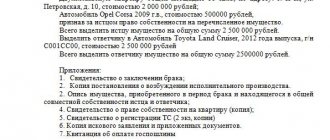Any owner has the right to exercise ownership of his property, use it, dispose of it at his own discretion, and receive income from its use. When your real estate, equipment, transport or other things are in the possession of third parties without your consent, you have the right to demand from them through the court to return them to the owner. What is the peculiarity of such a procedure as claiming property in court?
When may it be necessary to reclaim property?
Types of claims
Your property may end up in the wrong hands for various reasons, and depending on this, the claims will be different:
on imposing the obligation to return property within the framework of contractual relations;
Situations may be different, for example: the lessor may demand the tenant to return his property upon termination of the lease agreement, the bailor may demand his property from the custodian, the buyer has the right to demand that the seller transfer an individually defined item, and the seller has the right to return the goods to the buyer if they fail to pay .
reclaiming property in connection with restitution for an invalid transaction;
Attention! Formulate your requirements correctly. According to the law, restitution is the return by the parties to each other of everything received under an invalid transaction. And only if it is impossible to return the property in kind, you can demand compensation for its value. In one case, an entrepreneur was denied compensation for the cost of furniture under an invalid municipal contract, since he did not prove that he tried to return his furniture and that it was not preserved in kind (Resolution 15ААс of 03/07/2021 in case A32-57790/19) .
Vindication claim – recovery of property from someone else’s illegal possession.
Keep in mind that vindication can be demanded not only by the owner, but also by an institution, an enterprise that owns property under the right of economic management or operational management, even from the owner (Article 305 of the Civil Code), as well as the owner by virtue of acquisitive prescription (clause 17 Resolution of the Supreme Court and Supreme Arbitration Court No. 10/22 of April 29, 2010).
By the way, you can download a sample statement of claim for the recovery of property from someone else’s illegal possession.
When to involve a lawyer if it is necessary to claim property in court?
It is best to engage a lawyer when you find out that your property is illegally held by third parties.
What can a lawyer do?
- will correctly indicate the nature of the claim and help formulate the claims (vindication, restitution or other), otherwise your claim will not be satisfied,
- will determine the proper defendant,
- will help collect evidence of ownership of property,
For example, when claiming movable things, it is not enough to just confirm that it was on the company’s balance sheet; it is necessary to confirm the legality of acquiring ownership of it (agreement, transfer and acceptance acts, invoices, etc.).
And if the ownership of real estate arose in you even before the state registration of real estate began, then if you have the necessary documents (purchase and sale or privatization agreement, transfer and acceptance certificate), you have the right to file a vindication claim, even if the property is registered in the Unified State Register of Real Estate for by another person.
- will calculate whether the statute of limitations has expired,
- will defend your interests in court.
The disputed property is with the creditor
The creditor does not have the right to retain the thing and satisfy his claims from its value if it is in the possession of the debtor. In this case, the question arises whether the creditor can retain the thing when a third party has ownership of it. The courts take conflicting positions in this situation.
Most courts believe that only something that the debtor has the right to dispose of can be retained. If the thing belongs to a person who does not owe anything to the creditor, then the retention is illegal.
Indeed, in this case, the right of ownership is limited, and there is a threat of loss of such a right, since retention, unlike a pledge, is carried out without the consent of the owner. In judicial practice, the opposite position is also found - the creditor has the right to retain any thing that must be transferred to the debtor.
The creditor can only retain something that is not his own and must be transferred to the debtor. You cannot retain goods that the buyer has not paid for if, under the terms of the contract, ownership passes to the buyer at the time the goods are transferred from the seller to the buyer.
Who is the defendant in such disputes?
If there is a contractual relationship, even if the transaction is subsequently declared invalid, it is easier to determine the defendant - this is the other party to the transaction.
But a vindication claim is filed when there are no obligations between the parties.
You have the right to demand the return of your belongings from a citizen, individual entrepreneur or company who illegally owns them:
- from an unscrupulous purchaser - in any case (acquired property due to fraudulent activities, theft),
- from a bona fide purchaser, if he received the thing free of charge from a person who had the right to dispose of it - in any case,
- from a bona fide purchaser, if he received the thing under a paid contract from someone who could not sell it - when the owner did not intend to alienate his things.
The home buyer was recognized by the court as a bona fide purchaser because he took all possible measures to check the disputed apartment: through realtors, through a bank (Appeal ruling of the Moscow City Court dated June 28, 2019 in case No. 33-16575/2019.)
The owner did not want to alienate his home, since it was proven that he did not sign the documents (Appeal ruling of the Moscow City Court dated February 12, 2019 in case No. 33-3648/2019).
Statute of limitations for claiming property
You have the right to demand vindication within three years from the date when you became aware or should have known that your interests were violated, as well as about the proper defendant, but in any case, do not miss the ten-year period from the date of violation of rights.
The deadline begins to run:
- for movable things - from the moment they are discovered by the actual illegal owner (clause 12 of the Information Letter of the Supreme Arbitration Court of the Russian Federation dated November 13, 2008 N 126);
- for real estate - from the date when the plaintiff became aware or could have known about the violation of his rights, in particular, about the entry in the Unified State Register of Real Estate belonging to a third party (clause 57 of the Resolution of the Supreme Court of the Russian Federation No. 10 and the Supreme Arbitration Court of the Russian Federation No. 22 of 04/29/2010 ).
But the date of entry in the Unified State Register does not in itself indicate that from the date of its appearance a person should become aware of the disposal of property from possession; the circumstances of each specific case must be taken into account (Review of judicial practice, approved by the Supreme Court of the Russian Federation on October 1, 2014)
The debtor's right to the retained thing
At the time of the commencement of application of the interim measure, the thing held must belong to the debtor. However, the law does not specify on what right the thing may belong to the debtor.
He can possess property not only by virtue of ownership, but also by virtue of a contract. For example, equipment left on the landlord's premises belongs to the tenant under a separate lease. Is it possible to apply deduction in this case?
Judicial practice proceeds from the fact that retention can be applied only in relation to things owned by the debtor by right of ownership or other property right.
Even in the Resolution of the Presidium of the Supreme Arbitration Court of the Russian Federation dated October 10, 2006 No. 7226/06 it was specifically stated that, within the meaning of Art. 359 of the Civil Code of the Russian Federation, the subject of retention can only be a thing that belongs to the debtor by any right, that is, a thing that is alien to the creditor.
And here is what is stated in the Resolution of the Federal Antimonopoly Service of the Central District dated July 22, 2014 in case No. A14-12142/2013.
The quoted fragment, among other things, well reflects the essence of retention as a security measure. It is a measure of operational influence on the debtor, aimed at protecting the violated rights of the creditor. Thus, retention is a way of self-protection of law.
In the Resolution of the Federal Antimonopoly Service of the North-Western District dated April 18, 2014 No. F07-1940/2014 in case No. A56-38472/2013, it was concluded that the creditor can retain not only an item owned by the debtor, but any item subject to transfer to the debtor.
Until the debtor fulfills his obligation, the creditor, as the holder of the thing, has only the right of possession over it. He has no right to dispose of it.
The Presidium of the Supreme Arbitration Court of the Russian Federation, in Determination No. VAS-11455/13 dated 09/06/2013, indicated that the actual destruction by the contractor of the result of work performed does not constitute retention. The destruction of a thing is the determination of its legal fate, in other words, its disposal, which is unacceptable.
The only thing the creditor can do is to receive satisfaction from the value of the retained thing according to the rules provided for in relation to the sale of collateral.
Do you need to follow the claim procedure if you want to reclaim property?
In courts of general jurisdiction, compliance with the claims procedure in this category of cases is not mandatory.
In arbitration courts, a mandatory claim is not needed if you are simply claiming property, but if you are demanding compensation for losses or making other monetary claims, then the claim is mandatory, and do not forget to attach a copy of it and documents about its sending to the defendant to the statement of claim.
We will help you file a claim in court
Get help
Concept and conditions of retention
Retention is discussed in paragraph 1 of Art. 359 of the Civil Code of the Russian Federation.
This is the general holding procedure. The creditor has the right to retain the thing until the corresponding counter-obligation is fulfilled. To put it simply, the right to retain unpaid items. For example, a workshop has the right not to give a repaired phone to a client until the repair work is paid for in accordance with the contract.
A special rule is provided for entrepreneurial relations. In them, withholding can be used to secure claims for obligations not related to payment for the item or compensation for losses associated with it.
In this article, we will consider the use of retention specifically for relations between entrepreneurs.
Even if the rights to the thing after it came into the possession of the creditor passed to a third party, this is not a basis for termination of retention. Therefore, the sale or other method of transfer by the debtor of the retained property to a third party will not help him rescue the necessary things.
To apply a withholding, four conditions must be met:
- the debtor's property came into the possession of the creditor legally;
- at the time the lien begins, the property belongs to the debtor;
- the debtor has overdue obligations to the creditor;
- there is no prohibition on retention by law or contract.
There should be no questions about the last conditions. If there were no unfulfilled obligations, then the creditor would not even think about retaining some thing belonging to the debtor. After all, the latter regularly fulfills its obligations.
The idea of withholding arises when it is necessary to spur a debtor who does not fulfill his obligation on time, for example, who does not pay rent.
Problems arise when the first two conditions are met. They are resolved at the level of judicial practice. But there is no uniformity in it. I have given only one view of retention and related practice. It is possible that you will find another practice, sometimes the opposite of the one discussed below.
How to file a claim to recover property from someone else’s possession?
In the statement of claim for the return of an item from someone else’s illegal possession, please indicate:
- the court to which you are applying (at the location of the real estate and at the place of residence of the defendant when claiming movable property),
If both parties to the dispute are companies or individual entrepreneurs, file a claim in the arbitration court; if the plaintiff and/or defendant are citizens, then file a claim in a court of general jurisdiction.
- names (full name) and details of the plaintiff and defendant,
- evidence of ownership of this property, the illegality of its removal from your possession and/or the dishonesty of the purchaser,
- your requirements,
- signature of an authorized person,
- application.
What must be included with the claim?
- Certificates of company registration in the Unified State Register of Legal Entities and tax registration (if the plaintiff is a legal entity),
- Power of attorney and diploma of the representative (if he signs),
- A receipt for sending the claim to the defendant,
- A receipt for payment of the state duty (calculated from the value of the property), a request for deferment of payment of the state duty or a document for exemption from payment of the state duty,
- Documents supporting your arguments.
Retention is not prohibited by law or contract
Withholding is possible only if it does not contradict the nature of the legal relationship between the parties and there is no prohibition on it in the law. For example, the consumer does not have the right to retain the goods until the seller eliminates the defects or returns the money, since the Law “On Protection of Consumer Rights” requires that the defective product be transferred to the seller. This means that the general rules on retention of things do not apply in this case.
The parties to the agreement may also prohibit the creditor from retaining the thing, even if such a method is provided not only by the general rules of Chapter 23 of the Civil Code, but also by special
If, during the lien, the ownership of the thing is transferred from the debtor to a third party, the creditor retains the right of lien.
Therefore, the parties can not only exclude the retention of a thing, but also independently agree on the procedure for retaining a thing in the part that is not regulated by law, provided that the clauses of the agreement do not contradict the law. For example, it is possible to provide for mandatory preliminary notification by the creditor of the debtor about the retention of the thing: establish in the agreement the period of notification and its procedure.
- Personal lawyer
- Representation in court
- Administrative and legal disputes
What to do if a court decision to reclaim property is not enforced?
In order to induce the defendant to return your property as quickly as possible, you can petition the court to impose a judicial penalty (astrenta) in accordance with Art. 308.3 of the Civil Code of the Russian Federation. Courts also impose a judicial penalty in the event of failure to comply with a court decision on the return of property from someone else’s illegal possession.
The Supreme Court of the Russian Federation, in its ruling dated November 16, 2021 in case No. A03-22220/2016, refused to transfer the entrepreneur’s cassation appeal to the board. The court decision, along with imposing the obligation on the entrepreneur to return the equipment to the owner, also indicated a legal penalty in the amount of 50,000 rubles. per month after the expiration of 30 days from the date of entry into legal force of the court decision and until the month of actual execution of the court decision.
Lawyer for reclaiming property in court
The lawyers of our bureau have been representing the interests of clients both in courts of general jurisdiction and in arbitration courts for more than 18 years.
Who are we?
We can protect you as a party in disputes:
- economic;
- corporate;
- arising from supply contracts, contracts, ship contracts, leases, etc.
- in bankruptcy cases;
- in cases of challenging transactions in bankruptcy and within the framework of debt collection and others.
Claiming property in court - this service in our office is provided exclusively by professional lawyers. Each specialist has at least 7 years of experience.
How do we resolve questions from clients about reclaiming property?
- We provide consultations, draw up a statement of claim, and collect a package of documents for the court;
- We represent your interests in the case of reclaiming property in the instance that has jurisdiction over your dispute (arbitration and court of general jurisdiction);
- We will appeal a court decision made not in favor of the principal in the appellate and cassation instances;
- To protect your interests, we will go all the way to the Supreme Court of the Russian Federation, if necessary.
By the way, here is an example of our case on protecting interests in the RF Armed Forces:
The lawyers filed a cassation appeal to the RF Armed Forces and proved the validity of the expenses and their proportionality to the income of the official and his family.
View document









